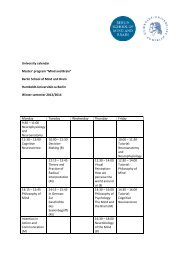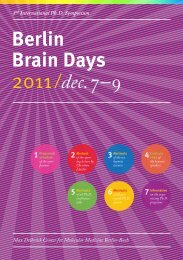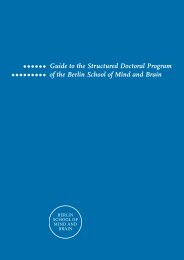Download - Berlin School of Mind and Brain
Download - Berlin School of Mind and Brain
Download - Berlin School of Mind and Brain
Create successful ePaper yourself
Turn your PDF publications into a flip-book with our unique Google optimized e-Paper software.
Sebastian Philipp<br />
On the Influence <strong>of</strong> the <strong>Brain</strong> on the <strong>Brain</strong>: Be “Aware”!<br />
Altered statistics in external sensory stimuli lead to a change in the neural representation<br />
<strong>of</strong> the respective sensory entity. This is the well investigated phenomenon that the<br />
external world shapes representations in the brain. However, besides some recent studies<br />
it is not yet investigated how internal, mental conditions – such as attention, imagery or<br />
meditation – effect neural sensory representations – which is the question <strong>of</strong> whether <strong>and</strong><br />
how the brain itself shapes representations in the brain. The effects <strong>of</strong> altered external<br />
stimulation <strong>of</strong> the body on somatosensory representations are well investigated by<br />
psychophysically measuring the tactile acuity <strong>of</strong> human subjects. Recent studies report<br />
effects <strong>of</strong> long-term Tai Chi practice on tactile acuity [2]. Tai Chi is a sensory attentional<br />
training where practitioners focus attention on the body's extremities. Study results<br />
showed that Tai Chi practitioners' tactile acuity in the finger tips is superior to that <strong>of</strong> the<br />
matched controls. However, it is questionable if these effects are only due to the subjects'<br />
having focused their attention on their extremities during the long-term practice over<br />
several years or if it is also due to the bodily aspects <strong>of</strong> the long-term Tai Chi practice. In<br />
our study, we investigate the effect <strong>of</strong> a short meditative training – a purely mental<br />
training – on tactile acuity in the finger tips. Tactile acuity <strong>of</strong> subjects with ample<br />
experience in Zazen is measured psychophysically before the training period. During the<br />
training period <strong>of</strong> two hours, subjects are asked to be completely aware <strong>of</strong> the arising<br />
sensory percepts in their fingertips while preventing external stimulation by not moving<br />
their h<strong>and</strong>s. After training, subjects' tactile acuity is measured again. We compare tactile<br />
acuity before <strong>and</strong> after the meditative intervention. In my presentation I will give an<br />
introduction to the topics <strong>of</strong> meditation <strong>and</strong> alterations <strong>of</strong> sensory representations by<br />
external stimulation. Furthermore, I will show preliminary results from our current study<br />
on the effects <strong>of</strong> meditation on tactile acuity <strong>and</strong> I will mention possible philosophical<br />
aspects <strong>of</strong> this study in order to yield an open discussion with the audience.<br />
17





